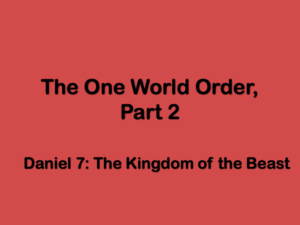Daniel 2: 36-48 But What Does if All Mean?
Daniel tells Nebuchadnezzar the statue represents a sequence of future kingdoms, starting with Nebuchadnezzar and Babylon as the head of gold. Next Persia and Greece would dominate the world, followed by Rome. But then it gets weird.

In the last post, Daniel told Nebuchadnezzar the contents of his dream. Now in verses 36-48, Daniel gives the king the interpretation.
“This is the dream; and we will tell its interpretation before the king. You, O king, are king of kings, to whom the God of heaven has given the kingdom, the power and the strength, and the glory; and wherever the children of men dwell, he has given the animals of the fields and the birds of the sky into your hand, and has made you to rule over them all. You are the head of gold.
Daniel 2: 36-38
Persia and the Hellenistic Kingdoms
Daniel tells Nebuchadnezzar the Neo-Babylonian kingdom is the head of gold. Daniel affirms that Nebuchadnezzar is powerful, but also reminds the king this power is given to him by God.
“After you, another kingdom will arise that is inferior to you; and another third kingdom of brass, which will rule over all the earth.
Daniel 2: 39
After the Neo-Babylonian kingdom, two more kingdoms will arise in succession. Historically, we know that the Persian, or Achaemenid Empire, conquered the Neo-Babylonian kingdom in 539 BC, 44 years after the events of chapter 2. In turn, we also know that Alexander the Great conquered the Persian Empire in 331 BC. Later, in Daniel chapter 8, Persia (chest of silver) and Greece (thighs of brass) are confirmed as the second and third kingdoms, respectively, to succeed the Neo-Babylonian kingdom.
The Fourth Kingdom: Iron Mixed with Clay
There is a fourth kingdom that follows Greece, and here the symbolism is less clear.
“The fourth kingdom will be strong as iron, because iron breaks in pieces and subdues all things; and as iron that crushes all these, it will break in pieces and crush. Whereas you saw the feet and toes, part of the potters’ clay, and part of iron, it will be a divided kingdom; but there will be in it of the strength of the iron, because you saw the iron mixed with miry clay. As the toes of the feet were part of iron, and part of clay, so the kingdom will be partly strong, and partly broken. Whereas you saw the iron mixed with miry clay, they will mingle themselves with the seed of men; but they won’t cling to one another, even as iron does not mix with clay.
Daniel 2: 40-43
There is almost universal agreement that the legs of iron are represented by the Roman Empire, but there is less agreement about the feet of mixed iron and clay. This may be because Rome was clearly in the past, but the mixed iron and clay may still be in the future.
In these verses, we begin to enter the realm of eschatology, the study of Biblical end times. Eschatology attempts to use the text of the Bible to answer the question, “Will the world continue as it is forever, or if there will be an end to the world as we know it?” Many Christians and churches today choose not to address this question or think about it at all. For those that do choose to study eschatology, several different schools of thought have arisen.
The fourth kingdom of Daniel chapter 2 is one of those subjects where different schools of thought have arisen. The consensus among Biblical scholars is the historical fourth kingdom, the one that followed the Greek kingdoms of Alexander the Great’s successors, was the Roman Empire. However, some of the language of verses 40-43 (iron and clay mixing with the seed of men) are difficult to reconcile with our knowledge of the Roman Empire. Because of this difficulty, scholarly consensus begins to crumble and two major competing views have arisen. Both schools agree that Daniel is describing, at least in part, the Roman Empire, something that was still in the future at the time of the writing of Daniel. This agreements is even shared by those who support a late date for Daniel.
Preterism
The first school, the Preterist view, argues that all prophecy was fulfilled in 70 AD when Roman legions destroyed Jerusalem and the temple. Preterist comes from the latin praeter, which means past, so preterism argues that all prophecy was fulfilled in the past (70 AD). Because preterists hold all prophecy was fulfilled in 70 AD, they tend to allegorize some of the language of Daniel and Revelation because some of the wording does not literally fit past historic events. It also allegorizes the mixing of iron and clay as relationship between the Roman elite and either the common folk, or the subjugated nations of the Roman Empire.
Futurism
The second school, Futurism, holds that while some prophecy was fulfilled in 70 AD, the majority will be fulfilled at some time still in the future, hence the name futurist. Futurists take a more literal interpretation of the language of Daniel and Revelation, and since some verses were not clearly fulfilled by the Roman Empire, futurists argue for a yet future, world-wide totalitarian government. This future government is sometimes known as the Kingdom of the Beast, which is how the kingdom is described in Revelation and Daniel chapter 7.
The futurist view also views the iron and clay statement as difficult to interpret. When the verse is addressed, futurists predict some mixing of future powers. The use of iron seems to suggest some form of resurrected Roman Empire, perhaps mixed with other people groups. One proposed explanation is the genetic mixing of humans and demons. As weird as this idea may seem, there is a precedent in Genesis Chapter 6, where the text seems to describe the intermarriage of angels and human women. Another proposed explanation is transhumanism, or technology mixed with humans, such as cybernetic or genetic enhancements.
The fourth kingdom of Daniel Chapter 2 is a complicated topic, so we will dedicate an entire future post to more detailed discussion.
The Kingdom of Heaven
The next section of the dream describes a time after the fourth kingdom, when God will establish a heavenly kingdom on Earth.
“In those day of those kings the God of heaven will set up a kingdom which will never be destroyed, nor will its sovereignty be left to another people; but it will break in pieces and consume all these kingdoms, and it will stand forever. Because you saw that a stone was cut out of the mountain without hands, and that it broke in pieces the iron, the brass, the clay, the silver, and the gold; the great God has made known to the king what will happen hereafter. The dream is certain, and its interpretation sure.”
Daniel 2: 44-45
All the kingdoms of man, including the fourth kingdom, will eventually be destroyed and replaced by a divine kingdom, one where God rules. This kingdom will rule the entire earth and will last forever. In the dream, the stone struck the statue at the feet, which suggest this destruction will occur at the end of the mysterious fourth kingdom.
The concept that God will rule directly on earth is known as the “Kingdom of Heaven,” or the “Kingdom of God.” This prophecy is fleshed out further in other books of the Old and New Testaments, most notably in a later chapter of Daniel and in the book of Revelation.
Nebuchadnezzar’s Reaction
Nebuchadnezzar is amazed by the miracle: not only has Daniel given him the interpretation of the dream, but he also told the king the contents of his dream, the very miracle the Chaldeans had declared impossible. Nebuchadnezzar praises God as the God of gods and rewards Daniel by making him the governor of the province of Babylon.
Then the king Nebuchadnezzar fell on his face, and worshipped Daniel, and commanded that they should offer an offering and sweet odors to him. The king answered to Daniel, and said, “Of a truth your God is the God of gods, and the Lord of kings, and a revealer of secrets, since you have been able to reveal this secret.”
Then the king made Daniel great, and gave him many great gifts, and made him to rule over the whole province of Babylon, and to be chief governor over all the wise men of Babylon. Daniel requested of the king, and he appointed Shadrach, Meshach, and Abednego, over the affairs of the province of Babylon; but Daniel was in the gate of the king.
Daniel 2: 46-49
In Ancient Near Eastern culture, an office at the gate of the city was a position of honor. It was to the gate that people would bring grievances for adjudication.
Previous: Verses 17-35
Next:




